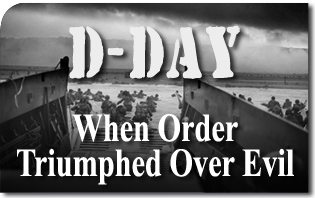 This June 6th marks the seventieth anniversary of the D-Day Normandy landings. While not the largest amphibious operation in history, it is perhaps the most significant. Europe was pinned beneath the boot of National Socialism, a godless, gnostic sect that swept God from public life. The Normandy invasion spelled the beginning of the end for Nazi Germany.
This June 6th marks the seventieth anniversary of the D-Day Normandy landings. While not the largest amphibious operation in history, it is perhaps the most significant. Europe was pinned beneath the boot of National Socialism, a godless, gnostic sect that swept God from public life. The Normandy invasion spelled the beginning of the end for Nazi Germany.
The scope of all that happened on D-Day is hard to fathom. Its success in all its many facets is a testimony to the powers of organization and order that once existed in America and her Western allies. On that day full of unknowns, some 160,000 soldiers, including paratroopers and amphibious troops, landed on the beaches and commenced operations in an area covering 12,000 square miles. Seven thousand naval vessels were involved; eleven thousand planes and gliders needed to be coordinated. All of this was done without the aid of computers.
There were several fronts that needed to be covered. There were five well-defended beaches under intense, withering fire without cover or possibility of retreat. In the air and sea, there were massive aerial and naval bombardments. Paratroop drops and glider landings placed troops behind enemy lines. There was also coordination with French resistance fighters who damaged and destroyed German transportation and communications. In addition, decoy and deception techniques were used to confuse German forces as to when and where the allies would land.
Not many veterans of that momentous day are still among us. How many people today even know the extent of what happened on that day? One must ask if what happened on that day is still taught with any importance in our nation’s schools.
D-Day tells the story of an incredibly complex strategy that remains a testimony to what a society can accomplish based on a dedication to duty, honor and country. While there were problems in society at that time, America was a nation that still fervently believed in God and His commandments. Not only did Americans believe in God, they sought His help and protection in war. Americans also were filled with a can-do spirit that overcame obstacles.
Cell phones, GPS, and the Internet did not exist at that time. Instead, plans had to be made based on human reason and quick judgment which often resulted in life-and-death decisions. There were no complicated rules of engagement, no micro-managing from front-line commanders.
Soldiers were expected to do their duty without the politics of politically correct opinions that would expose them to tainted blood. There were no women in or near combat to distract soldiers in their life and death struggles. This was not a push-button battle, but rather an up-close and personal one. Orders were issued and soldiers were expected to follow the traditional, civilized rules of war, and then, within those parameters, to do whatever it took to achieve their objectives.
Strategic and tactical decisions were based on moral absolutes and not on moral relativism.
Society at the time was centered on faith, family and community. Everyone worked together to achieve victory. Americans on the home front also participated in the war effort. For the common good, Americans sacrificed. Resources were conserved and recycled for much-needed war material. Common were the blue and gold star flags hanging on front porches, identifying a family member who served or who had given everything for America.
Americans believed in hierarchy and order. Children grew up respecting the authority of parents, teachers, clergy and temporal leaders. This foundation was part of what made the invasion successful.
The average soldiers back then did not have the material comforts we take so much for granted today. They did not have the same opportunities for education. Yet they had an internal order inside their souls that helped them to think and act rationally and perseveringly. Men at that time were largely ruled by reason and not emotion.
It was not modern technology that won the great, complex battle of D-Day but the ordered use of reason, faith in God, the virtue of fortitude and the willingness to offer one’s life for a cause greater than one’s self.
During this seventieth anniversary, it is good to gratefully and admiringly reflect on the kind of order that existed in the souls of American soldiers on June 6th, 1944, which made possible so great a victory. On this D-Day, we should pray that America return not only to this order but the entire Christian order from which it came.

